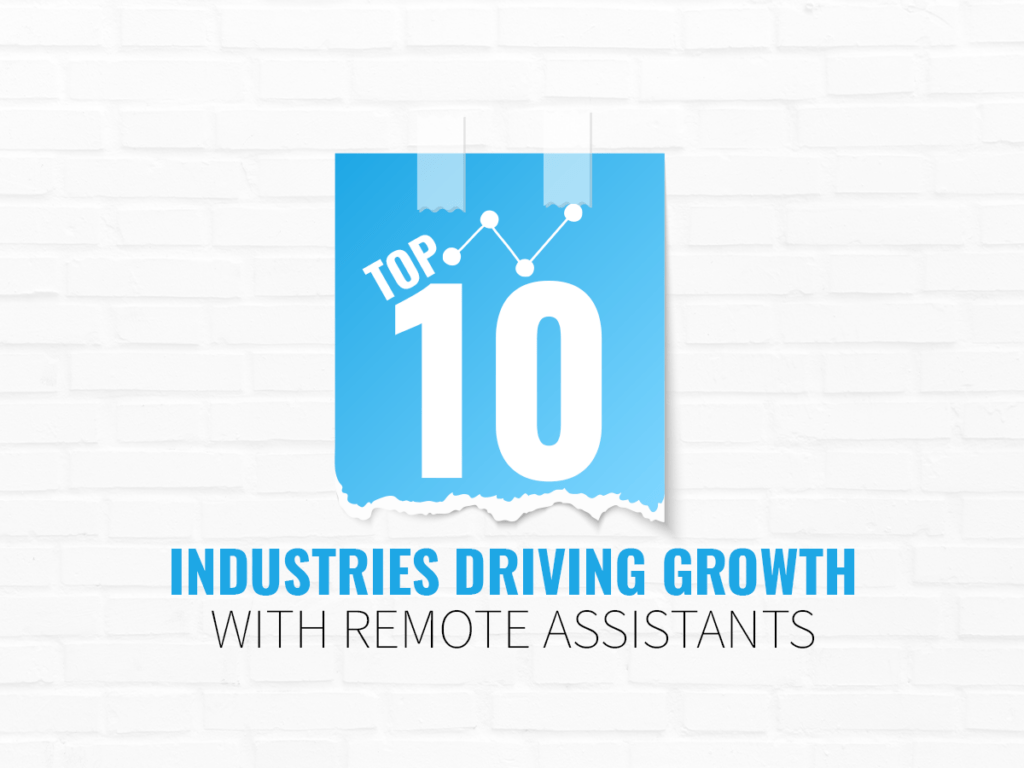The virtual assistant industry has been growing in recent years, but is hiring a virtual assistant worth it? Who needs remote assistants? The answers, quite simply, are yes, and more than you think. There are many types of virtual assistants, fulfilling niche and general tasks for dozens of industries.
In the past few years, many companies have shifted operations online. With this influx of online work, organizations have taken to hiring virtual office assistants to increase efficiency and profitability. Skilled assistants can often perform routine tasks on a quick timeline and at a fraction of the cost of a regular employee.
They provide help with scheduling and reminders, research, social media management, data entry, and other routine tasks. They can also do many higher-level tasks like CRM maintenance, customer service, expense reports, and invoicing.
No matter the kind of business you have, you can trust Wing to help you succeed. Wing leverages technology to keep costs at a minimum and provide VA services to clients in a variety of industries.
Here are ten industries that are using different types of virtual assistants to increase efficiency, streamline operations, and generate growth.
Types of Virtual Assistants in Human Resources
Human Resources is a dynamic field that requires professionals to have an extensive network of personal connections and client relations. Remote assistants are supporting many firms by taking over everyday administrative tasks that don’t require this kind of expertise. Many tasks in the recruiting industry, like screening calls, are perfect for delegating to a human resources VA.
In the past. a company recruiter would need to spend 45 minutes on a call to screen worthy candidates, now she can eliminate that task entirely with the help of an experienced HR virtual assistant. Compounded over many calls throughout the course of a year, that means major savings in time and energy.
There are many types of remote assistants who might work for human resources. A general VA, for example, handles routine tasks requiring little to no HR expertise.
A generalist assistant can do the following for HR teams:
- Email management
- Document formatting
- Expense reports
- Schedule management
Specialized VAs in HR Teams
Some assistants focus on an area of specialization within the broader human resources industry. Here are some types of virtual assistants in HR:
- Recruitment VA – Virtual recruiters streamline the hiring process. They take care of writing clear job descriptions, posting job ads, and conducting initial screening of applicants. Recruiter VAs could also be asked to conduct initial interviews and handle employee onboarding.
- Payroll Administrator – Your VA could also handle reconciling employee leave and attendance data. They use the team’s HR portal to capture hours logged in and leaves taken, resolving discrepancies and informing relevant personnel.
- Onboarding VA – Virtual assistants could also take care of emailing new hires, preparing onboarding kits, and following up on required paperwork for hiring.
VAs are cost-effective and hiring them results in significant time savings. As contractors who work from home, VAs can be quickly trained to do project-based jobs without needing to use company facilities or having to provide company benefits. When you factor in this reduction in the cost of labor, a virtual web assistant proves to be a major asset for HR and recruiting operations.
Types of Virtual Assistants for Law Firms
Many leading law firms depend on VA support to effectively cut down on costs and boost profitability. General VAs can help with plenty of tasks at law firms that do not require direct experience in the practice.
Here are tasks that a law firm can assign to a virtual assistant:
- Note-taking and transcribing
- Document preparation and mailing
- Scheduling meetings
- Secondary research
Specialized VAs in Law Firms
Law firms that want to outsource dictation, legal research, and other higher-impact tasks would often look to VAs with relevant training (e.g. a degree in paralegal studies, law administration, etc.).
At times, though, law firms have other needs. A common pain point for practices is finding clients. Often, a law firm founded by practicing attorneys could find it tricky to source new accounts.
Here are some types of specialized VAs that can help in client acquisition:
- Digital Marketing VA – For a firm to be competitive today, it needs to look beyond attorneys’ professional networks. A practice needs a solid online presence, and a digital marketing virtual assistant can help build that.
- Sales Development Representative – Law firms seeking high-profile clients need experienced sales persons, ones who are expert closers. Having remote SDRs working alongside attorneys will give a firm the edge it needs.
- Dedicated Receptionist – A firm with a dedicated professional taking and routing calls is a plus. It shows callers that the company is polished and professional.
Busy law firms have reported using virtual assistants to help with overflow support for legal secretaries and accounting departments. That’s because virtual assistants can handle many back-office tasks such as bookkeeping, invoice write-ups, invoice delivery, and expense tabulation as well.
Virtual Assistants for Marketing Teams
According to studies, the digital marketing industry is projected to reach $786 billion by 2026. Things are well on their way to that figure; in the U.S. alone, the advertising industry is estimated to be at $460 billion. Companies need marketing, and especially marketing online, to thrive in today’s business landscape.
But deploying a robust marketing strategy requires a significant investment. One way businesses can trim the costs while keeping productivity up is by hiring remote digital marketing assistants.
Here are tasks that a marketing agency can assign to a remote assistant:
- proofread emails
- execute email campaigns
- research prospects or competitors
- research influencers in a space
- set up your business’ social media
- answer messages from customers
Specialized Assistants in Marketing
Marketing teams can delegate more than routine tasks to virtual assistants. Often, you can get experienced marketing assistants. You can expect specialized VAs to execute entire projects or processes on their own. Below are some common types of marketing virtual assistants.
Social Media Virtual Assistant
One key area where remote office assistants add value for marketing firms is social media. By 2022, the number of social media users is estimated to be as much as 82% of the U.S. population, making it one of the most popular online activities.
VAs can create and implement content calendars. They can also provide instant feedback to customer comments on social media accounts in a personable manner. Using remote office assistants to get this work done allows full-time staff to devote time to the critical task of converting these followers into buyers and increasing revenue.
Content Writing Virtual Assistant
VAs can conduct simple audits of on-page SEO. They can devise and build a content strategy as well as deliver content pieces to support this strategy. SEO best practices are consistent for any company using the web for marketing. A strong SEO framework builds credibility for a business, improves user engagement, and delivers quantifiable results. All of these things contribute to driving growth for businesses.
Graphic Design Virtual Assistant
A virtual assistant specializing in graphic design is also valuable to an agile marketing team. Graphic design assistants can create social media graphics, logos, images for blogs, brochures, landing pages, and more. With a graphic design virtual assistant in your team, you can iterate on your past campaigns quickly while cutting down on costs.
Read More About VAs Across Industries
Information Technology (IT) Virtual Assistants
IT systems and infrastructure are the backbone of modern businesses. They enable the efficient flow of information, communication, and data management, which are essential for day-to-day operations. IT also provides access to data and analytics that enable informed decision-making.
But IT administrators and technology officers often have a steady stream of things to do, and many routine checks and tasks often fall through the cracks. Fortunately, it’s possible to hire IT support or developer virtual assistants to take on low-impact but necessary activities.
Here are things to delegate to an IT virtual assistant:
- customer support requests
- guiding customer onboarding
- attend support calls
- system updates
- scheduling emails
- knowledge management
Routine tasks like these are ideal for VAs because you can train them quickly to troubleshoot most technologies. The work can also be done remotely, which is perfect for a team of VAs working from home. Remote office assistants are contract employees, which cuts down on costs like healthcare benefits for businesses. These benefits are handled by the VA’s employer, which limits the financial impact of hiring and training costly technicians.
World-class Talent at an Affordable Price
At Wing, we have a convenient process of matching teams with assistants. We also offer month-to-month subscriptions for remote assistant services. Assistants are pre-screened and trained, there are no contracts involved, and payment is done easily via credit card.
Best Types of Virtual Assistants for Startups
Startups often have unique needs and challenges, and the choice of specialized virtual assistants can greatly impact their success.
It’s not hard to see why VAs are so helpful to new businesses. Startups often face difficult time constraints and massive challenges to achieve their goals. Remote assistants provide an enormous value to these young organizations because they are cost-effective, fast-acting, and detail-oriented.
Here are tasks that startups across industries could delegate to a virtual assistant:
- answering queries
- customer support
- scheduling calls
- inbox management
- taking meeting minutes
- researching competitors
- generating leads
- social media management
Specialized VAs in Startups
The specific needs of a startup may vary based on its industry, goals, and stage of development. It’s important for startup founders to assess their requirements and budget to determine which specialized virtual assistants are the most valuable for their unique situation.
Here are some specialized virtual assistants who are well-suited for startups:
- Content Writer/Copywriter: Startups need to establish their online presence and create engaging content for their website, blog, social media, and marketing materials. A content writer can help craft compelling content that resonates with the target audience.
- Graphic Designer: Visual branding is crucial for startups. A graphic designer can create a memorable logo, design marketing materials, and produce eye-catching graphics for the website and social media.
- Social Media Manager: Managing social media accounts and creating a strong online presence is vital for startups. A social media manager can strategize, create, and schedule posts to engage with the audience and build a brand following.
- Digital Marketer: A digital marketer can assist in developing and executing online marketing strategies, including search engine optimization (SEO), pay-per-click (PPC) advertising, email marketing, and social media marketing.
- Developer: For startups with a strong online presence, a web developer can ensure the website is user-friendly, visually appealing, and optimized for performance.
VAs can also assist with sales. Businesses have seen a rapid increase in call volume and leads closed with an experienced virtual assistant dedicated fully to cold calls and conversions. The result is a robust sales pipeline that increases profitability. In this case, hiring a remote employee is not just a savvy business move, it is a meaningful investment in the future of the business.
Types of Virtual Assistants for Real Estate
Real estate professionals juggle a myriad of tasks, from managing property listings to nurturing client relationships and staying ahead in a highly competitive market. To thrive and succeed, they often turn to a dedicated and highly specialized team of Virtual Assistants (VAs) who are well-versed in the unique demands of the real estate industry.
Here are tasks that real estate agents could assign to generalist VAs:
- Customer support
- Scheduling calls
- Inbox management
- Meeting minutes
Meanwhile, here are some specialized virtual assistants suitable for real estate agents or teams:
- Real Estate Virtual Assistant: These virtual assistants are trained specifically for the real estate industry. They can assist with various tasks like managing listings, coordinating showings, following up with leads, and conducting property research.
- Transaction Coordinator: A transaction coordinator can handle the paperwork and administrative tasks associated with real estate transactions, ensuring that contracts, forms, and deadlines are managed efficiently.
- Lead Generation Specialist: Lead generation specialists can help real estate agents identify potential clients through market research, online advertising, and outreach efforts. They can also manage customer relationship management (CRM) systems to nurture and track leads.
- Social Media Manager: Building an online presence is crucial for real estate agents. Social media managers can create and schedule posts, engage with the audience, and promote listings and open houses.
By having a VA handle this type of work, Real Estate professionals can focus on closing more deals faster, generating new leads, and seeking new growth opportunities.
VAs Ideal for Management Consulting
A remote office assistant is on call at any time of the day or night to assist busy managers, consultants, or supervisors. VAs can book travel arrangements, manage appointments, and interface with meeting attendees. These remote support professionals are available by email, text, phone, or however the client needs.
Here are specialized VAs that can help a management consultant:
- Executive Assistant: A high-growth startup often requires the founder or CEO’s time and attention to be focused on strategic decisions. An executive assistant can manage their schedule, handle communications, and provide administrative support, allowing the leader to concentrate on growth initiatives.
- CRM Data Entry VA: This type of VA inputs a variety of data into the CRM, such as contact details, company information, communication records, and lead information. They ensure that the information entered into the CRM is accurate and consistent, categorize and tag records, and identify and rectify duplicate records and inconsistencies.
- IT Support Specialist: IT support specialists ensure that the consultant’s technology infrastructure is secure, efficient, and able to support remote work and communication.
- Marketing Specialist: Marketing specialists can help consultants promote their services, develop marketing strategies, and manage online and offline marketing campaigns. They can produce high-quality reports, articles, and thought leadership content that establishes the consultant’s expertise and promotes their services.
Wing remote assistant services are high-quality solutions to the costly and time-consuming process of onboarding additional staff. Wing’s global staff of college-educated, English-speaking assistants provides support to executives and consultants before, during, and after traveling abroad on business.
According to statistics, management consulting firms are expected to top $895 billion in global market size in 2021. VAs help drive that growth by handling daily tasks, giving consultants more time to focus on more important priorities like solving their clients’ problems and generating new business.
Types of Virtual Assistants for Investment Firms
- Bookkeeper VA: A bookkeeper virtual assistant is essential for managing the firm’s financial records, handling expenses, and ensuring compliance with tax regulations. They maintain accurate financial records, reconcile accounts, and support the overall financial health of the investment firm.
- CRM Data Entry Assistant: Investment firms often have leads and prospects to nurture. A CRM data assistant can categorize, tag, and track these leads, helping the firm prioritize follow-ups and convert leads into clients. By regularly updating and validating client records, a firm will get accurate information on client preferences, investment history, and communication history. This enables more personalized client interactions.
- Digital Marketing VA: A digital marketing virtual assistant can help the firm establish and maintain a strong online presence, which is essential for attracting and engaging clients and prospects in the digital age. Effective digital marketing can give the investment firm a competitive edge by differentiating it from competitors and positioning it as a trusted and knowledgeable provider of financial services.

Virtual Assistants for e-Commerce
The rapid expansion of the e-commerce industry has made it an excellent proving ground for virtual web assistants. E-commerce remote assistants contribute a lot to e-commerce companies. Some routine tasks of e-commerce VAs include:
- community management
- social media management
- proofreading product listings
- price monitoring
- CRM data entry
- light edits on product photos
Companies that conduct e-commerce business with major retailers such as Walmart, Amazon, eBay, Etsy, and Shopify have also had success with virtual assistants who interface with those platforms and manage online stores. The result is increased sales and profitability.
In addition, experienced e-commerce VAs can handle the following:
- customer support calls
- order fulfillment
- live chat support
- inventory management
- processing returns/refunds
- maintaining store CRM
VA support is invaluable because remote assistants can respond quickly to customer support requests, shipping issues, and changes in retailer requirements. This is driving increased growth in a rapidly expanding marketplace.
Besides e-commerce remote assistants, retailers could also hire a:
- Customer Service Representative: CSRs in online retail are the front-line support team, addressing customer inquiries, resolving issues, and ensuring a positive shopping experience. Their role is vital in building customer satisfaction, trust, and loyalty, which are crucial in the competitive e-commerce market.
- Digital Marketing Assistant: A remote digital marketer manages online advertising, optimize email marketing, and improve visibility on the web. These things are critical for attracting customers, increasing sales, and growing a brand.
- Content Writer: Writers create product descriptions and compelling content to enhance SEO and improve the overall online shopping experience. This leads to better product understanding and increased visibility in search engines, ultimately driving website traffic and improving conversion rates.
- Web or App Developer: Developers are essential in online retail. They work on website maintenance, improvements, and enhancements, ensuring a seamless online shopping experience for customers.
VAs in the Healthcare & Wellness Industries
As with the other industries on this list, remote office assistants are making a positive impact for healthcare and medical professionals too. ResearchandMarket.com projects that the market for these services in the healthcare sector will expand to $1.7 billion by 2025.
Some tasks a healthcare practice can delegate to a generalist remote assistant are:
- appointment scheduling
- social media management
- drafting and proofreading emails
- light bookkeeping
Remote assistants with more training or experience in the healthcare industry can take on more specialized tasks. For example, medical scribes can do the following:
- Coordinate and collect data from patients’ health backgrounds to help create an accurate patient medical history.
- Input physician findings, from diagnoses and symptoms through to prescriptions, and follow-up instructions.
- Review and communicate inconsistencies and missing information found in recordings to ensure quality control in dictation.
- Develop and proofread digital and in-person marketing materials for promotional or informational purposes.
- Transcribe recorded medical dictations by healthcare professionals for accurate medical records.
- Coordinate sending medical records to various recipients.
Assistants also deliver clinic guidelines, answer patient questions, and provide non-clinical support like records management and streamlining patient discharge. As such, a key advantage to hiring virtual assistants in this context is timing and flexibility.
Wing provides real, happy, helpful people to support healthcare clients. Having a responsive human being on the other end of the phone makes a big difference in the customer experience.
Who Needs Remote Assistants?
There are an estimated 1.2 billion freelancers globally. This number has been steadily increasing year over year. If properly trained, the right remote office assistant can be a major asset to a business’s productivity. What’s more, it doesn’t matter what industry the business is in; there are tasks that almost every business requires, which a VA can perform with ease.
But is a VA worth it? Consider time savings first. According to a Stanford study, virtual assistants are 13% more efficient than in-house employees. This increase in productivity is attributed to the convenience of working remotely and contributes directly to a client’s productivity.
Hire Managed, Dedicated VAs from Wing
Consider cost when deciding whether a remote office assistant is worth it for you. In the United States, VAs get paid an average of $32.27 an hour. This is the equivalent of $1,291 a week or $5,593 a month.
Wing provides these services with a flat, affordable fee that is much lower than the current market rate. We’re able to do this with the help of technology and a management system geared towards effective outcomes for clients.
Having a competent virtual assistant is a great investment for businesses. Remote assistants free up staff to focus on more meaningful, profitable work. Wing also has a global staff of English-speaking remote office assistants who are available to provide these mission-critical services for businesses in a variety of industries.
This team of motivated professionals is supported by a robust network of artificial intelligence which helps to keep costs low and streamline efficiency. Find out how we can help your business today—schedule a call to get started!
Dan Eder writes frequently about digital marketing trends, SaaS, and e-commerce. He has previously worked as a content writer at an SEO agency for tech companies, an e-commerce specialist at a Fortune 500 company, and a journalist for several educational outlets. Read more from him at www.daneder.com.












